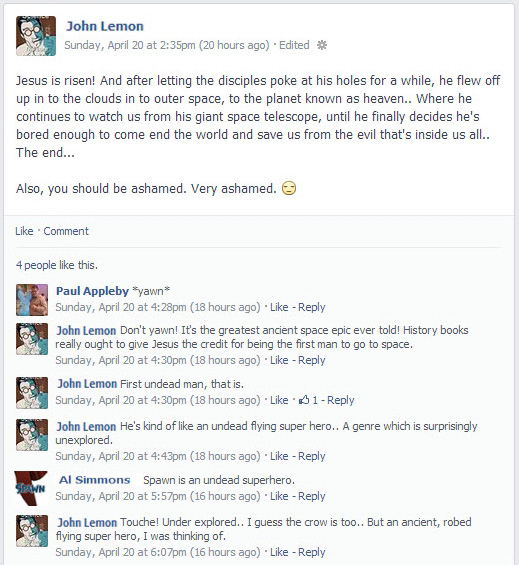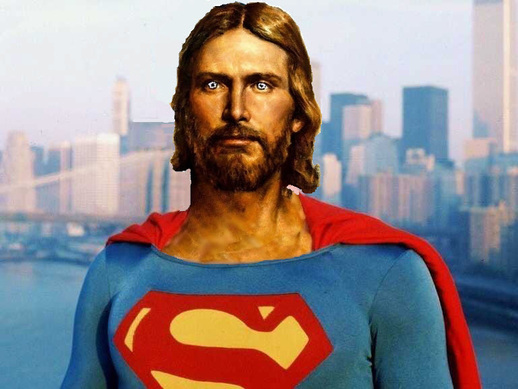|
Paul Appleby is an ordained minister in the Christian Church (Disciples of Christ), and an instructor in the areas of Theology and Evangelism with the Christian College of Georgia. He received his BA in Biblical Studies and Theology from Malone University and an MDiv and ThM from Emory University where he studied the intersection of Christian Theology and popular culture. He is a loving husband, and father of three. John 20:19-31 CEB It was Sunday afternoon. No games were on. Dinner was still a few hours away. I had some heavy reading to do, but the gravitational pull of this lazy day was too great to overcome. I hopped on Facebook, and as I delved further up and further in to the miasmal swamp of nostalgic laziness, I came across this status update from an old Youth Group friend: Before I continue, let me digress a moment to explain the yawn. Letting go of the comments for a moment, and leaving aside the fact that he chose the double-entendre "poke at his holes" while the KJV has Thomas asking to "… thrust his hand inside" Jesus (much dirtier if you ask me), in my opinion the whole "let's amuse our atheist friends and try and offend the sensibilities of silly Christians by lampooning what we believe is their monolithic understanding of a so-called 'holy' text in order to try and start a Facebook flame war" thing is played out. And yes, I realize that this is a motive that I am projecting onto John, and that likely says a whole lot more about me than about him but so it goes… You see, John is an atheist who (like me) grew up in a fundamentalist Christian home. His post lampoons a fundamentalist's grasp of the identity of Jesus, but fails to move beyond it. Here, Jesus' ascension is taken quite literally as him flying up into the clouds to planet heaven where he takes special means to observe what is still going on down here on earth (a view that accidentally corresponds quite closely with a first century Jewish understanding of structure of the cosmos). So to John, (and oddly to many Christian fundamentalists) Jesus is sort of a capricious undead proto-Superman. John rejects this idea as patently absurd. For what it's worth, I can appreciate why one would. And while I understand that to examine a joke is to murder it, this one wasn't particularly novel or funny to begin with (sorry John), so I doubt I'll lose any sleep over what comes next. John's story and the story he's referencing (along with the entire Gospel it is found in), hinge upon a central question: "Who was Jesus?" This is the fundamental question of the Christian faith. Some would say he was just a first century rabbi whose teachings sat somewhere on the spectrum of those of Rabbi Hillel and Rabbi Shammai and weren't particularly revolutionary for his time. A surface read of his teachings and those of his contemporaries demonstrates that this is a sensible, though perhaps overly simplistic, answer. Others (like Reza Aslan), say he was a political revolutionary and they point to his trial and death at the hands of the Romans as evidence. It is a compelling case and one can hear whispers of sedition in many of his teachings. Some scholars (I'm looking at you Bart Ehrman) say he was a failed apocalyptic prophet. This makes sense when you look at some of the terrifying predictions contained in the gospels. Still others, like a former Christian philosophy professor turned atheist NRA instructor and firearms enthusiast friend of mine, would say he was "a sweetheart of a guy, but a nutcase" who truly believed he was divine. These are all reasonable proposals. For what it's worth I think that the last of them is the most reasonable of all in light of the record of the Gospels. It grasps the idea that the enduring power of Jesus' teachings hinge on his identity. "You have heard it said… but I tell you…" echoes again and again in the Sermon on the Mount, and therein places Jesus above both Moses, and the Law. "Your sins are forgiven" he tells a paralytic, to the chagrin of those in attendance who rightly identify that it is solely the prerogative of God to forgive. "It is not up to me who sits at my right and who sits at my left hand, but it is up to the Father…" He tells the mother of two up and coming disciples, demonstrating an identification of the Kingdom of God spoken of in the prophets and his own mission. "Truly I tell you, today you will be with me in Paradise…", he told the thief being crucified next to him. In light of these readings it is reasonable to assume that Jesus thought he was something special. It is Jesus' identity that gives the crucifixion its importance, and his teachings their authority. Now, I don't know which of the above named proposals Thomas would have bought into following the apparent failure of Jesus' mission on Good Friday, but something freaky happened that forever altered Thomas' answer to the question of the identity of Jesus- at least according to our reading. He encountered the risen Christ. At its most basic level, Thomas had an experience. In his encounter with the risen Christ he was given three imperatives. The first was to be at peace. The second was to experience first-hand (pardon the pun) the resurrected Christ, "Put your finger here. Look at my hands. Put your hand into my side." The third was an order based on his experience, "No more disbelief. Believe!" There's an old Christian doctrine called "Prevenient Grace" the gist of it is that God has to reach out to us before we can reach out to God (or like the old hymn puts it, "Oh, how I love Jesus, because he first loved me…"). I believe that this is true. This is also why I am a Christian. Like Thomas, something happened to me. I had an experience of the resurrected Christ. However, it wasn't exactly like Thomas' experience. Had it been, had I seen him, had I touched him, I don't think I would have believed… I think I would have looked into therapy and possible institutionalization. What for Thomas was evidence that Jesus was resurrected would have been, for me, evidence of a psychotic break. My first encounter with the risen Christ happened in a way that is difficult to put into words because it was so alien. It was different than any other experience I had before. I can liken it to some things. It was like a feeling of being known in my entirety, and because (and in spite of) that being loved and accepted. It was like that feeling you get when you instantly connect to a new friend that makes it feel as though you knew each other since the sandbox. It was like the contradictory feeling of pure exhilaration and total peace that occurs the first time a confession of love is requited. It was a feeling of oneness within and without, the feeling that all is as it should be. When he spoke, his words resonated in me and moved through me, but they were not words that I would have known to speak. At its end, what it came down to was the same thing that rounded out Thomas' encounter- "No more disbelief. Believe!" And with Thomas I was left with one reply, a simple confession of the identity of the one who addressed me in that moment, "My Lord and my God!" Since that day, I have been living out the implications of that confession. The call to believe is one that shapes us in our totality. It calls us to trust, to be faithful, to assent, to share a vision and a dream. It calls us to journey in a direction that is counter-intuitive. I don't understand Jesus' identity in the same way that John does. John and I have a long history and oddly the first time I can recall hearing the voice of the risen Christ I was sitting next to him. He understands Jesus' supposed identity in the terms of an undead superhero, who went away to heaven and will return to bring the world to an end. He understands Jesus in this way and he rejects him on those grounds. As an adult, if that was the Jesus I encountered, I would too. That is a Jesus that defies reason. I don't think it is as simple as all that, and I don't believe in the kind of either/or mentality that inspires this interpretation of Jesus (I believe Jesus to be more of a both/and kind of guy). In my inmost being when I experienced Jesus I encountered a living Christ calling me to live out of a kingdom that is already but not yet: to do justice, to love all- because that is the true thread that ties the universe together -a thread that is stronger than anything, even death. This Christ is alive and well, and he is my Lord and my God. If you like what you are reading there are many ways to connect:
And as always, contributions are greatly appreciated. |
Categories
All
Archives
October 2023
|





 RSS Feed
RSS Feed